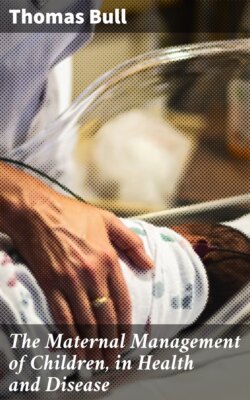Читать книгу The Maternal Management of Children, in Health and Disease - Thomas Bull - Страница 20
На сайте Литреса книга снята с продажи.
DIET AND REGIMEN OF A WET-NURSE.
ОглавлениеTable of Contents
The regimen of a wet-nurse should not differ much from that to which she has been accustomed; and any change which it may be necessary to make in it should be gradual. It is erroneous to suppose that women when nursing require to be much more highly fed than at other times: a good nurse does not need this, and a bad one will not be the better for it. The quantity which many nurses eat and drink, and the indolent life which they too often lead, have the effect of deranging their digestive organs, and frequently induce a state of febrile excitement, which always diminishes, and even sometimes altogether disperses, the milk.
It will be necessary then to guard against the nurse overloading her stomach with a mass of indigestible food and drink. She should live as much as possible in the manner to which she has been accustomed; she should have a wholesome, mixed, animal and vegetable diet, and a moderate and somewhat extra quantity of malt liquor, provided it agree with her system.
A very prevailing notion exists that porter tends to produce a great flow of milk, and in consequence the wet-nurse is allowed as much as she likes; a large quantity is in this way taken, and after a short time so much febrile action excited in the system, that instead of increasing the flow of milk, it diminishes it greatly. Some parents, however, aware of this fact, will go into an opposite extreme, and refuse the nurse even that which is necessary. Either excess is of course wrong. It is difficult in general terms to say what ought to be considered a proper daily allowance, but some is in general necessary; and whenever a woman has been used to drink malt-liquor, she will rarely make a good wet-nurse if she is denied a reasonable quantity of that beverage. Good sound ale sometimes agrees better than porter. It may be well here to remark, that in London, I frequently meet with severe cases of diarrhoea in infants at the breast, fairly traceable to bad porter, which vitiating the quality of the milk, no medical treatment cures the disease, until this beverage is left off or changed, when it at once disappears.
The nurse should take exercise daily in the open air. Nothing tends more directly to maintain a good supply of healthy milk, than air and exercise; and the best wet-nurse would soon lose her milk, if constantly kept within doors. Sponging the whole body also with cold water with bay-salt in it every morning, should be insisted upon, if possible: it preserves cleanliness, and greatly invigorates the health. United with this, the nurse should rise early, and also be regularly employed during the day in some little portion of duty in the family, an attendance upon the wants of the child not being alone sufficient.
An amiable disposition and good temper are very desirable. A violent fit of passion may exert so peculiar an influence in changing the natural properties of the milk, that a child has been known to be attacked with a fit of convulsions after being suckled by a nurse while labouring under the effects of a fit of anger. The depressing passions frequently drive the milk away altogether. It is hence of no small moment, that a wet-nurse be of a quiet and even temper, and not disposed to mental disturbance.
